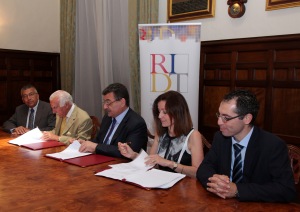From an early age we are taught that charity should be selfless, but what’s wrong with donating money towards something that could, one day, benefit you or your loved ones? Here, CEO of Research Trust (RIDT) Wilfred Kenely explains how community funding has aided research in a multitude of spheres.
Did you know that recent research conducted in Malta discovered a biomarker that will help doctors classify breast cancer patients for selection therapy? And that this discovery is so significant that two scientists working on it have been invited to present it at international fora? More importantly, however, did you know that €135,000 of the total sum needed to conduct this research were donated by people like you? Over the past decade, the University of Malta has invested heavily in research across a wide spectrum of areas. Significant investments in equipment, laboratories and other infrastructures came as a direct result of the EU structural funds, made available once Malta joined the Union in 2004. Malta’s participation in the EU’s research programme also contributed to this investment. Yet, constant funds are needed to ensure that this activity is sustained and that our scientists get the best training they can. That requires additional funding mechanisms and a steady and sustainable flow of serious funding. Thus, RIDT is doing just that, but the organisation needs our help if it is to continue funding essential research.
“Over the past couple of years, RIDT has funded or received funds for projects across a number of faculties and departments,” says Wilfred Kenely, the CEO of the Research Trust. “For obvious reasons, the bias is in favour of health and medicine, but not only. For instance, we have received funds which are financing a PhD scholarship in Maritime Law, and we have also attracted donations for studies in
digital marketing, ICT and economics, among others. “We are also finalising a mobile dental clinic, which will be conducting a national survey on oral health, while providing dental care to patients who may not be able to visit a dentist for one reason or another,” he adds.
The importance of this research – apart from the obvious benefits – is that Malta’s researchers are at the forefront of world-class studies that could potentially change people’s lives for the better. And all this is possible thanks to your donations.
“The biggest return that any donation can get is the long-term benefit,” Wilfred explains. “It’s an investment in the future of our country and our lives. “Obviously, no one can ever guarantee a return on investment in research, but it’s pivotal to keep in mind that the quality of life we are used to today is the result of an investment in research some time in the past. “The fact that, nowadays, we live longer lives in more comfortable settings is the result of research that happened over the years in medicine, technology and much, much more,” he argues. “ The fact that we are living a much better life today than say a 100 years ago, is not a coincidence.” “So we should not be skeptical about research taking place in Malta, on the contrary, we should believe more in our capabilities, and in the skills of our human capital. We should believe that, yes, given the right resources, collaborations and networking opportunities, there is a lot that our researchers can achieve and a lot that the University of Malta (UoM) can contribute to, even when it comes to the international community, which we already form a part of.”

LifeCycle Foundation’s donation following the 2012 Cycling Challenge in favour of research in renal disease
Nevertheless, although the discoveries that have taken place in Malta are remarkable, Wilfred believes that the most important breakthrough has been the beginning of a change in public perception with regards to research.
“Donating towards a just cause is always a noble deed but, in parallel to that, RIDT has introduced a culture of supporting research through public financing and through philanthropy – a system that, together with strong government investments, keeps the research centres going across Europe and in the USA.’’ ‘We believe that research funding should be primarily the role of the government, with the support of the community, because we all stand to benefit from the result of such investment. This should apply not only to industrial research, but also to the more fundamental studies which have over time, always produced the most revolutionary leaps of thought.’
To make public funding easier, RIDT has devised various schemes that allow UoM staff and students to donate money. Moreover, as Wilfred explains: “the legal notice that established the Research Trust gives a tax incentive to any donations that are of €150 or upwards – and that applies to every individual or organization that pays taxes in Malta.” The RIDT has also received the backing of the Malta Community Chest Fund on research in the genetics of osteoporosis, a cause that the President of the Republic has taken a keen interest in. So much so, that our conversation was cut short by a telephone call to discuss one of their upcoming meetings.
Shawn Baldacchino, recipient of a PhD Scholarship in Breast Cancer Research supported by Alive Charity Foundation and Action for Breast Cancer Foundation.
“It is so uplifting to have the President, and so many others – NGOs, corporates, Foundations, individuals – taking interest in this research, and to see that they are endorsing our initiatives” Wilfred concludes. “All this gives us the energy to do more and to work harder.”
You can contribute towards RIDT-funded research by visiting their website, www.ridt.org.mt; the platform also allows you to pick the area you’d like your money to be utilised for. You can also support initiatives or attend one of the fundraising events organised by the trust, including their lunchtime concert series which will start again in October. For more information about RIDT, please call +356 2340 8201.



